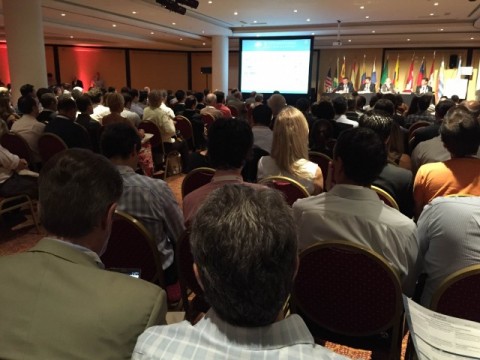In the future, everything around us will be managed by data, and those who have data will have power. We will inevitably live in a recorded and registered society, where everything will be captured. So, will anonymity be possible (or desirable)? What will it be like living in a society where everything you say and everywhere you go is captured?
These questions started the keynote speech by Andrew Lee, CEO of during the 50th edition of SEGURINFO Argentina 2015, the renowned Ibero-American Congress on Information Security. Once again, we are taking part in the conference and via We Live Security, and we are providing coverage so you don’t miss the event highlights.
Infinite Data, available for everyone
In his presentation titled: “Data Immortality – The future of everything,” Andrew Lee referred to immortality in many ways. Of course, there have been eternal figures such as Michelangelo, but now we have “the possibility of all the ideas,” as the Argentine writer Jorge Luis Borges used to say. Comparatively, in ancient times, it would have taken a long period to acquire enough knowledge to become experts, and it was not possible to capture everything. It would have taken a lifetime to acquire complete knowledge. However, as we digitalize the world, more of us become immortal, because we can access the knowledge of a whole life at the speed of light.
Just by seeing a person, perhaps with facial recognition software, I can know who he is. And as he’s doubtless on social networks, I can find out where he works, where he lives, what he likes and, with this, what he’s like. And I can know much more than it was possible to know in the past,” Lee ventured, before a packed auditorium. Basically, we live our lives in data.
Let’s consider that the brain contains 2.5 petabytes of information; and every day in 2012 around 2.5 exabytes of data were created. That’s the equivalent of 2,500 brains per day!
Therefore, he who controls all these data controls the future, and controls the past, similar to the world envisioned by George Orwell in 1984. In this world of the future, it’s possible to change and alter the information so truth cannot be distinguished and we have multiple versions of it. Even today, when watching the news, we see different aspects and how they are manipulated, and how different stories are told.
Perceptions of the world vary depending on who we are and where we are. Let’s consider that when searching for the same information in Google, we obtain different results due to the search preferences. As the famous Argentine writer Julio Cortázar said, “Memory is a mirror that scandalously lies.”
But the question remains: who owns this digital me? Everything is in the hands of third parties, and is being stored and shared with other third parties (governments, enterprises, retailers, medical insurance companies, etc.) of which we might not even be aware. The speaker imagines a hypothetical case where, having access to a patient’s medical records, we know he has heart problems, and that he ordered butter in the supermarket, which was home-delivered and is being stored in his smart refrigerator. Consequently, the company decides not to continue offering him medical insurance.
These data are our digital identity; they are us as much as we ourselves are. They can be searched and traced, and are just as recognizable as the person. This is where metadata come into play.
What happens if algorithms are not good enough?
It is important to consider that perhaps the algorithms used in data collection make, and only serve their purpose, merely collecting and providing data. If there’s an error, it might seem funny when something we’re not interested in is recommended on a certain web platform, because our tastes and interests were misinterpreted. However, let’s consider a medical term: bad algorithms, according to Lee, do more harm than good.
As information is abstract, calculations can be made based on it, but guesses are made in relation to things that happened in the past and general issues, and this isn’t always accurate. Digital precognition could be as good as ours, or better or worse.
In this respect, a bad algorithm could become a “digital cancer”: a disease caused by the uncontrolled replication of abnormal data in a dataset.
How to be immortal in the digital age
What happens if now threatening someone with immortality is worse than threatening them with death?’ asks Lee. “If I tell you I’ll never give you medical insurance, or I’ll never erase that criminal record, I’m talking about records that cannot be erased, that are eternal.”
All this allows us to be more and do more, but we must be sure that this benefits us and is not a practice whose only result is that more algorithms are created to share our information. As Lee said, “Privacy is the new frontier of security. Ironically, more transparency will create improved privacy, if we know how they work and what they are used for, so we can control them”.
Meanwhile, Internet of Things (IoT) devices are low-cost, low-maintenance and widely available, but require regular security updates to protect confidential information. We have already spoken many times of the security aspects related to devices connected to the Internet. However, what happens in the future if we have new devices that allow us to know when someone is lying due to their changing heart rate?
We are already digital beings, and not because we use technology. When a business prohibits use of cameras, but to buy or evaluate a certain product we are asked to scan a QR code, we see the world is already changing towards a digital environment present in all areas. The challenge is to adapt fast enough.
(This article originally appeared on the WeLiveSecurity Spanish version, and was translated courtesy of ESET North America)




